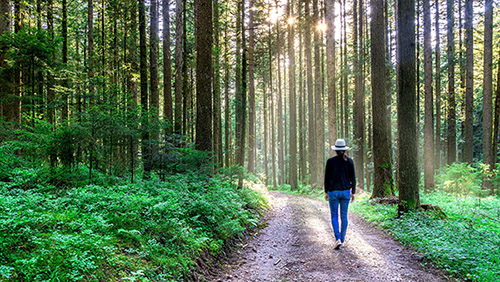UNE postdoctoral research fellow Dr John Charles Ryan started writing poetry as a teenager in response to walking around his New Jersey home.
He later embarked on an epic walk from Mexico to Canada** and is often reminded of theologian and philosopher Saint Augustine’s adage solvitur ambulando - ‘it is solved by walking’.
"Walking is the ultimate problem-solving, decision-making practice," he said.
"I often walk in order to gain a fresh perspective on a particular hurdle, to find my poetic voice or come up with an original view. In almost all cases I return with a better sense of the way forward.
“Even after 20 minutes of sauntering, I experience heightened gratitude for the world and the strange serendipities of life."
On a deeper level, John says the botanical world has much to teach us.
"Plants are part of the ecological balance of life; they are perpetually in a state of gifting," he said.
"They can lose body parts but live on and even flourish.
“The social lessons of the plant realm - values of cooperation, communalism, empathy, sustainability, the preservation of cultural memory across generations and much more - are profound.
"Unlike mobile creatures that fly away or scurry off as we enter the bush, plants bear witness to our walking.
“They are the faithful companions who will - most likely - be in the same spot the next time we amble that way.
"Direct experience of the natural world through walking inspires conservation values.
“We begin to notice again those things that have escaped, or fallen to the margins of our perception.
“We then want to protect that which nurtures us, and which we grow to love."
For Dr Ryan, plants embody hope, renewal and forbearance.
"In this epoch of ecological degradation, we are in dire need of new symbols of hope to illuminate the path ahead," he said.
"The future of humankind depends on our learning to become more plant-like in our ways of doing, thinking and being.
“It's time we turned away from single-minded competition and towards plant-minded cooperation among ourselves and in relation to other creatures."
"A nature boost does not even need to take a long time," says passionate walker, UNE Associate Professor John Malouff*.
"A five-minute walk with a focus on the scenery can do us a world of good.
"There is the beauty of nature, the fresh air and the experience of pleasing sounds and smells. If the walk is in a new area, there are discoveries at every turn.
“Walking in nature can increase positive feelings, making a person feel happier and more content with life.
“It can also decrease negative feelings, helping us to calm down when we feel agitated. It can inspire us, make us curious, and lead us to feel more open and even more alive."
A/ Prof Malouff likes being able to see trees, bushes, flowers and grass from the windows of his house and his UNE office.
"Seeing safe wild animals in nature is an extra treat; I have spent hours at UNE watching kangaroos, echidnas, and koalas," he said.
"It can be tempting to clear-cut everything to build more houses or plant more crops, but a walk in the bush reminds us of the importance of preserving nature."
So, if in doubt, find a park with some trees or head of into the nearest national park and ... put one foot in front of the other.
*Associate Professor John Malouff works in the UNE School of Psychology and has extensively studied and written on means of coping with stress.
**When he was 26 and confused about which direction to take in life, John Charles Ryan embarked on a 7-month solo walk - of 4184km - from Mexico to Canada. Nowadays, he prefers shorter, more relaxing jaunts, to counter the stresses of everyday life and, in Armidale, takes students out walking with naturalists as part of teaching poetry.


